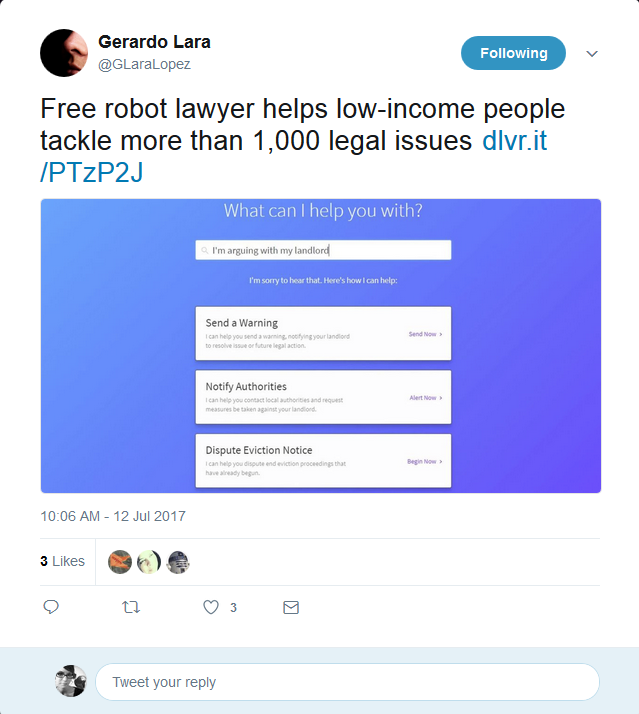Once in a while I come across something in my Facebook feed that grabs my attention and sets in motion a line of questions. In this case it was this tweet:

https://donotpay-search-master.herokuapp.com/
Law is something which has fascinated me.
What may be lawful may not be ethical.
What may be ethical may not be prescribed in the law.
There are so many laws, yet you’ll most likely only find out about them as you’re about to break them or have broken them.
While it rules the land and your life, law is not something you’re educated on in school, let alone Human Rights.
The more laws we create, the more laws we can break, the more criminals we create.
“The more laws and order are made prominent, the more thieves and robbers there will be.”
– Lao Tzu
The point that fascinates me the most though, is the whole lawyer-court-judge scenario.
While the law is written, it can be debated, fought over and the verdict eventually lies in the hand of a judge who requires to interpret the law and see how it all ‘fits together’.
The more money you have, the more likely you get that interpretation to be swayed into your favour. The law is after all vast, and you need time, people, and resources to work through the network of information.
Our current justice system is overloaded with laws and inefficiencies. Law ought to be clear and specific and not open so a few people’s interpretation, and ought to rather be a set of principles than hard and fast rules.
There’s so much crime because most of the laws existent today are geared towards control and more so the control of how money flows. If the foundation of society is unsound and ingrained in disharmony then naturally this will ripple through in people’s behaviour. Change the environment and conditions creating those symptoms of disharmony and the behaviour will change.
Parenting is one of those areas where this is very effectively observed. Conventional parenting based on control, obedience, authority – the type where there’s lots of rules create the highest level of chaos and disharmony and eventually, highly dysfunctional adults. If you however follow a few basic principles in the line of unschooling or conscious parenting – where less is more – the behaviour changes completely. Most people don’t want to break laws or do things that put themselves and others at risk, unless they are already within a position of insecurity and lacking a basic safety structure which ensures their survival and dignity.
Back to the lawyer bot – I think it would be ideal if law could function through such simple operations, where it’s accessible and clear cut, rather than having to go out of your way to make legal decisions and having to hire someone specialised in overcomplicated jargon. It should be a simple, administrative task to navigate. Additionally, with the digital age – public participation is becoming more and more feasible and something we really ought to look at, as well as e-democracy.
What are your views on justice and our ever more integrated connectivity through the internet?
If this topic interests you, I recommend you check out this video:
As a lawyer, I would say that a bot would not be sophisticated enough to consider all the issues that a consumer may have. In fact lawyers consider so many issues other than the law. It is a human interaction in most cases and increasing digitalisation can result in "efficiency" but there is a price to pay for that, which is increasing alienation of those who need greater assistance and contact with society. Just a thought 🙏🏽
That's a good point, a balance can be struck to make the most of both of those two dimensions. In many schools for instance, more and more digital boards are used instead of old school chalk boards, which also have entire lesson packets integrated. It is making the teacher less needed for teaching as transferring knowledge and information, and creates the space for teachers to stand more in a position of catering to the building of life skills. Thanks for pointing it out
Nice, good point. Especially the "the more rules, the more chaos and disharmony." Simple common sense that keeps one's perspective fresh!
I'm reminded of this story about a high-ranking government official who just had his conviction- and 12-year sentence for corruption- overturned on a technicality. It's unlikely a public defender or poor person representing themselves would have the same capacity to search for and successfully argue on such a minute detail of the law. A bot that could help someone look up legal questions for free could help equalize the playing field but, as @fleur pointed out, with the law being as sophisticated as it is, who's to say a simple computer program is capable of offering reliable advice?
As you stated, unequal treatment in the eyes of the law has deeper social roots related to preventable socioeconomic disparities, educational shortcomings, and a byzantine law system largely built to protect property and the right to profit even over basic human rights.
yes that's why I see that a simplification is also needed. If I look at for instance when I studies economics, in my first year I was taught a lot of basic premises which stand as the foundation of economics. A lot of these premises were unsound and as a result create a lot of ripple effects and consequences. Then in later years, you learn about all the myriad of ways to 'balance out' and kind of counter act all these consequences, which in most cases, are also unsound, creating again their own set of consequences .... and so it continues. This results in a vast network of rules and regulations which for most part can be greatly downsized and simplified if you do a general overhaul and create a solid foundation.